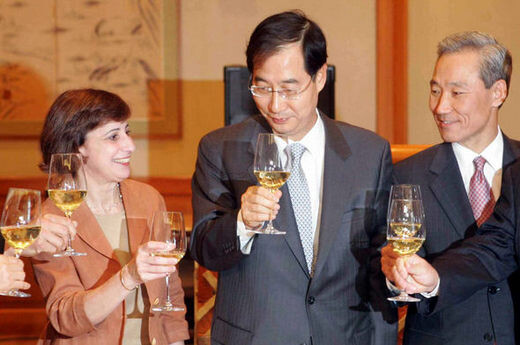hankyoreh
Links to other country sites 다른 나라 사이트 링크
'Some progress' in FTA talks; big issues still unresolved

South Korea and the United States wrapped up their fourth round of negotiations on a proposed free trade agreement (FTA) on October 27. They have made some progress, but left major issues to further negotiations to be held in December, when both sides are expected to make compromises. But talks on the FTA should continue until early next year.
Seoul's top negotiator Kim Jong-hoon said both sides have made "some progress" and called the process "satisfactory." He said this week's round of talks "laid the groundwork for accelerated progress" in future negotiations. The chief negotiator Wendy Cutler also said "In general, I think we moved forward the talks. This is a big step forward from the previous rounds." This comes in contrast with what he had to say following the third round of talks held in Seattle, which was that there had been "no practical progress."
Among other items, the U.S. said it would compromise on the auto parts sector by removing tariffs within 10 years. Its previous position was to designate the area as "undefined," which means there would be no timeframe for concluding debate over the issue, and it would likely not be included in the terms of the FTA.
Another proposal from the U.S. to immediately remove tariffs on as many as 1,000 industrial goods was mentioned as a major breakthrough by Seoul's top negotiator.
During the talks, South Korea proposed a list of products for tarriff removal. The list excluded some items deemed sensitive, which led to the rejection of the list by the U.S. side. Under a similar request list from the U.S. side, it reportedly demanded the removal of tariffs on its beef products.
As expected, however, little progress was made in major areas such as the automobile, pharmaceuticals, textiles, and agriculture industries.
The U.S. remains adamant upon keeping automobiles as an "undefined" category under the FTA, while South Korea is sticking to its stance that it wants concessions from the U.S. in that area.
Both countries failed to draw compromises on agriculture, textiles, pharmaceuticals, and inter-Korean business cooperation. The two countries have their own stakes in these areas, which continues to spell difficulty for a breakthrough.
The U.S., under mounting pressure from its local industries, is making efforts to induce a wider opening of markets in South Korea's automobile, pharmaceuticals, and agriculture markets, but the Seoul government is reluctant to make compromises in these areas.
South Korea, for its part is also pushing for lowering tariffs in the U.S.'s car and textiles markets, while trying to make tangible achievements in the trade remedies area. But it will face a tough road ahead, considering there has been no historical precedent in which the U.S. has compromised on trade remedies, save for its negotiations prior to the signing of the North Atlantic Free Trade Agreement (NAFTA) with Canada and Mexico.
Meanwhile, North Korea's nuclear test earlier this month has made it considerably tougher for South Korea to push for the U.S. to accept products made in the joint Korean Gaeseong (Kaesong) Industrial Complex as "made in Korea." Asked whether the Gaeseong issue could be a non-starter in the future talks, Cutler said, "yes."
Both countries are not seen as likely to easily compromise on the remaining areas, as they have to reflect demands from their domestic markets. As such, some experts expect that an FTA between the two allies will be a "diluted" one, with sensitive issues excluded.
Editorial・opinion
![[Column] Park Geun-hye déjà vu in Yoon Suk-yeol [Column] Park Geun-hye déjà vu in Yoon Suk-yeol](https://flexible.img.hani.co.kr/flexible/normal/500/300/imgdb/original/2024/0424/651713945113788.jpg) [Column] Park Geun-hye déjà vu in Yoon Suk-yeol
[Column] Park Geun-hye déjà vu in Yoon Suk-yeol![[Editorial] New weight of N. Korea’s nuclear threats makes dialogue all the more urgent [Editorial] New weight of N. Korea’s nuclear threats makes dialogue all the more urgent](https://flexible.img.hani.co.kr/flexible/normal/500/300/imgdb/original/2024/0424/7317139454662664.jpg) [Editorial] New weight of N. Korea’s nuclear threats makes dialogue all the more urgent
[Editorial] New weight of N. Korea’s nuclear threats makes dialogue all the more urgent- [Guest essay] The real reason Korea’s new right wants to dub Rhee a founding father
- [Column] ‘Choson’: Is it time we start referring to N. Korea in its own terms?
- [Editorial] Japan’s rewriting of history with Korea has gone too far
- [Column] The president’s questionable capacity for dialogue
- [Column] Are chaebol firms just pizza pies for families to divvy up as they please?
- [Column] Has Korea, too, crossed the Rubicon on China?
- [Correspondent’s column] In Japan’s alliance with US, echoes of its past alliances with UK
- [Editorial] Does Yoon think the Korean public is wrong?
Most viewed articles
- 1‘We must say no’: Seoul defense chief on Korean, USFK involvement in hypothetical Taiwan crisis
- 2Will NewJeans end up collateral damage in internal feud at K-pop juggernaut Hybe?
- 3[Column] Park Geun-hye déjà vu in Yoon Suk-yeol
- 4Why Korea shouldn’t welcome Japan’s newly beefed up defense cooperation with US
- 5Thursday to mark start of resignations by senior doctors amid standoff with government
- 6N. Korean hackers breached 10 defense contractors in South for months, police say
- 7[Guest essay] The real reason Korea’s new right wants to dub Rhee a founding father
- 8[Column] ‘Choson’: Is it time we start referring to N. Korea in its own terms?
- 9Kim Jong-un expressed ‘satisfaction’ with nuclear counterstrike drill directed at South
- 10[Editorial] New weight of N. Korea’s nuclear threats makes dialogue all the more urgent